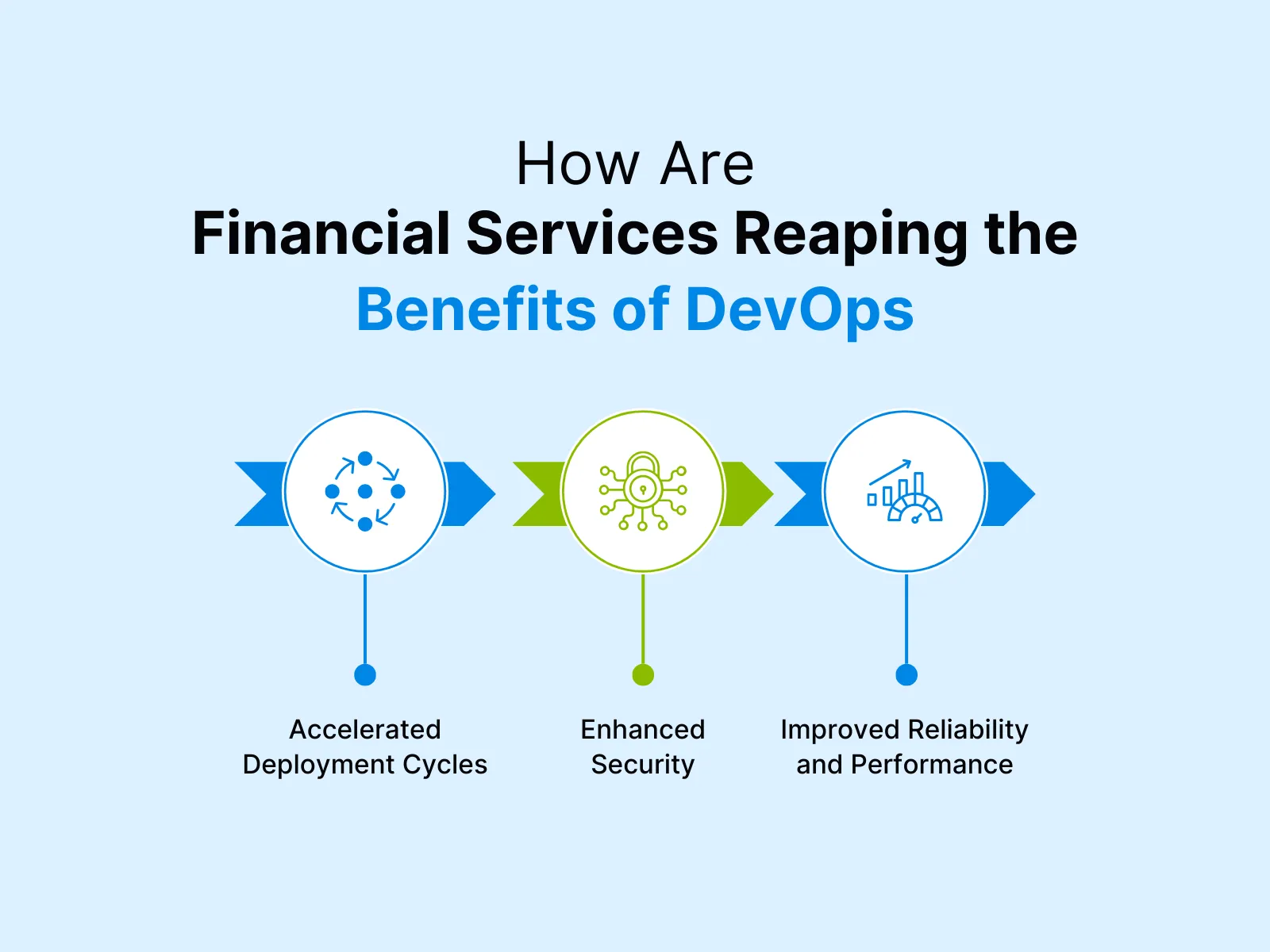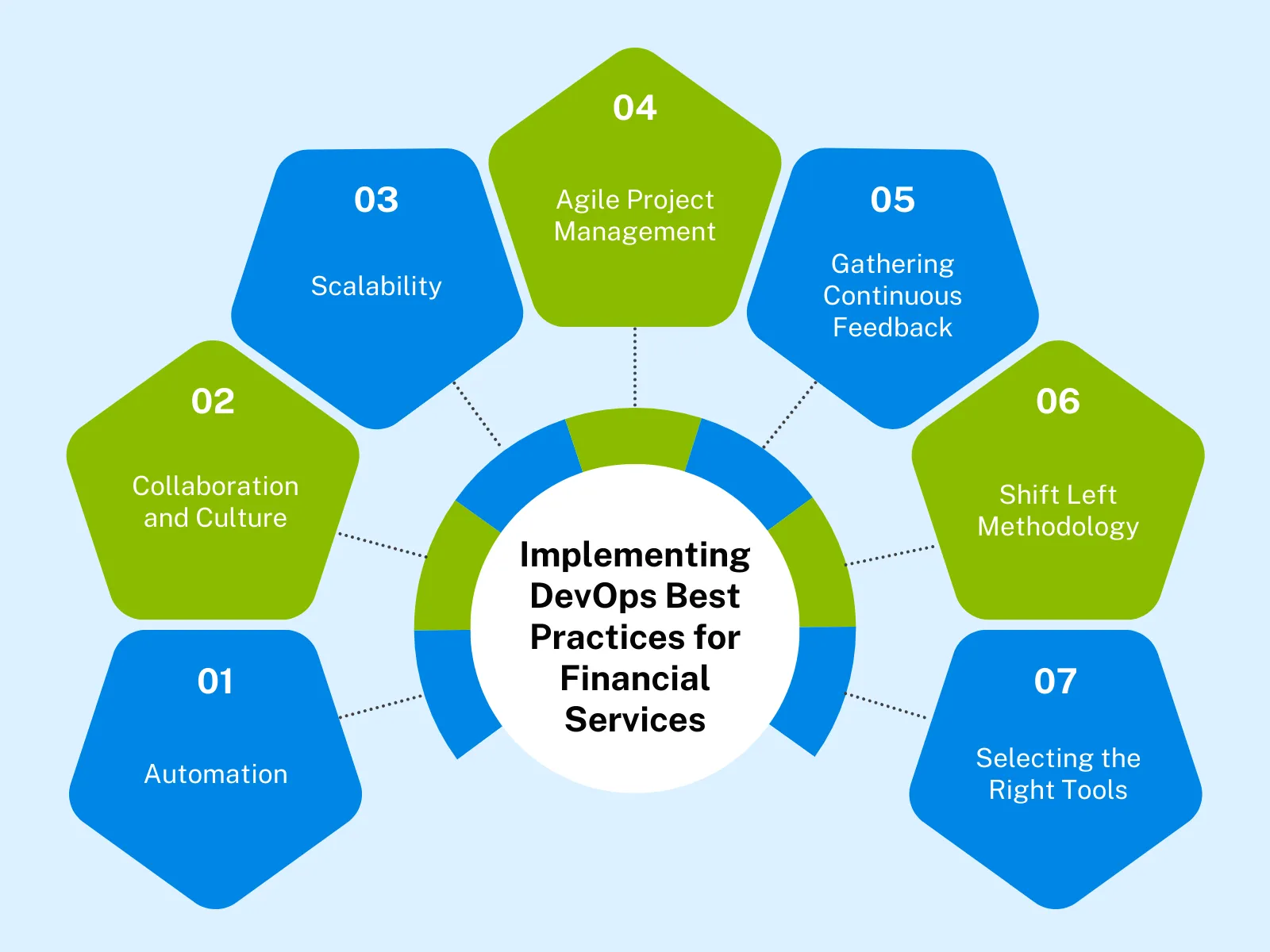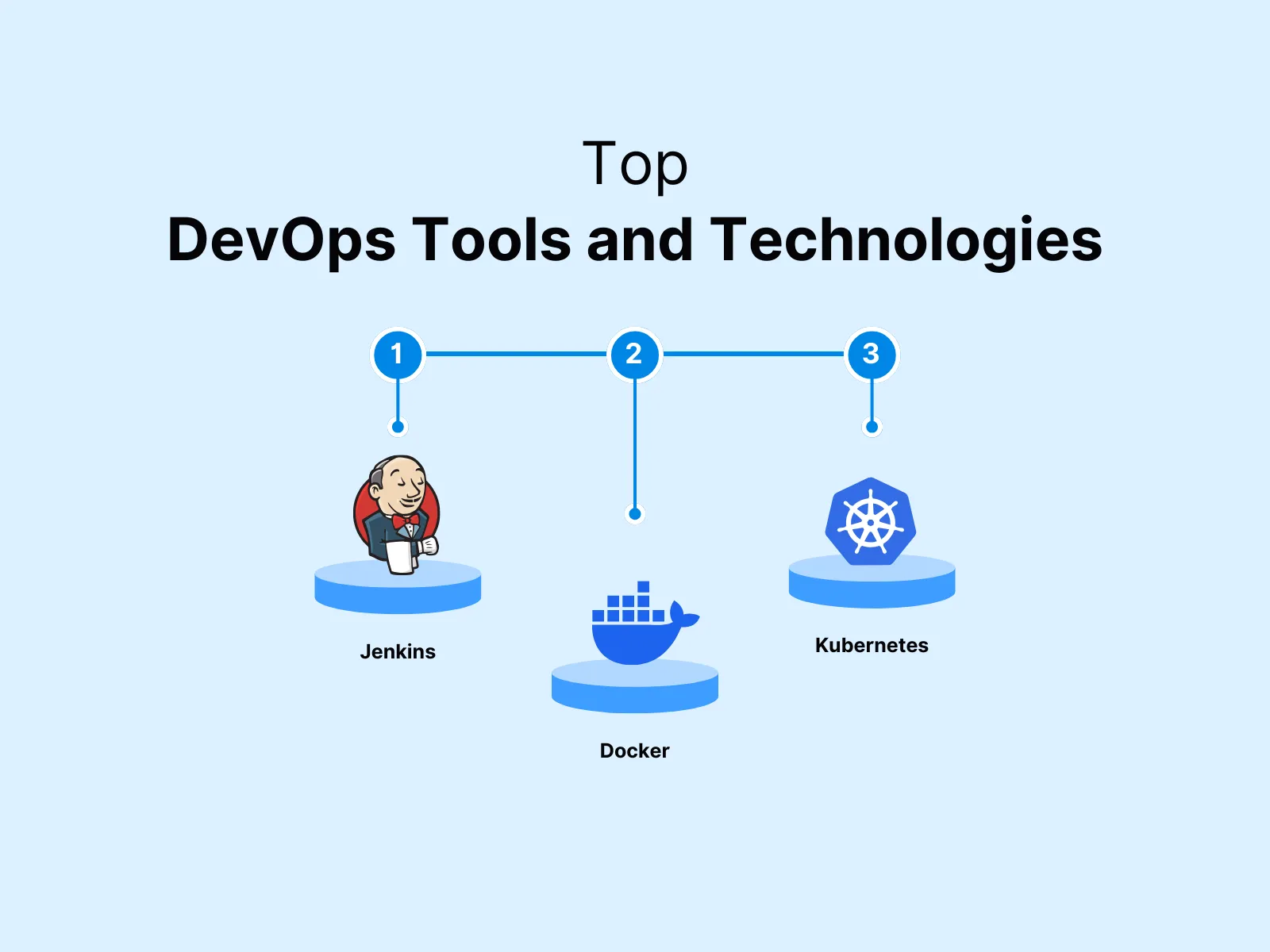How DevOps for SaaS Applications is Accelerating Financial Innovation
DevOps for SaaS applications streamlines development and deployment processes to revolutionize diverse industry verticals, including fintech. It accelerates time-to-market, enhances scalability, and ensures robust security, enabling financial services to adapt to market demands quickly and deliver innovative solutions faster and more efficiently.

Introduction
Financial institutions implement various digital platforms and pioneering trends to simplify operations and enhance customer experiences. However, they must also ensure and maintain high-end security and adhere to regulatory compliance.
Also, they are readily investing in advanced security measures and threat detection systems to minimize the risk of cyberattacks. However, they need to balance robust security with user convenience and manage the evolving nature of cyber threats.
Now, the question is how financial institutions use these groundbreaking technologies and solutions to provide continuous integration and delivery, bringing improved agility, scalability, and resilience into their core practices.
The answer is implementing the best DevOps practices for SaaS financial tools and applications.
In this blog, our senior DevOps engineer explains the role and significance of development and operations for software-as-a-service applications. He is going to highlight the benefits of DevOps for fintech further and drive you through real-world examples of how top financial institutions are leveraging DevOps to automate and optimize their processes.
While reading this comprehensive blog, you will further explore the role of custom software development in DevOps integration, alongside the best DevOps practices, tools, and technologies, and end your knowledge journey with an exploration of the future trends and latest innovations.
So, let’s get over to him now.
Understanding DevOps and Its Impact on SaaS Applications
DevOps is an innovative practice that blends development and operations, representing a cultural and technical shift aimed at improving collaboration between software developers and IT operations teams. All its core components, automation, continuous integration, continuous delivery, and monitoring accelerate the software development lifecycle and enhance operational efficiency.
So, Why is DevOps Essential for SaaS Applications
- Fosters Seamless Collaboration - DevOps fosters seamless collaboration between teams and ensures that software updates and new features are delivered faster and more reliably. SaaS providers must attain this agility to innovate, meet evolving user expectations, and stay competitive continuously.
- Automating Manual Tasks - Automation is a key DevOps solutions and services practice that aims to minimize manual tasks, mitigate errors, and speed up the development process. For SaaS software solutions, it provides quicker bug fixes and frequent updates to enhance the overall experience and improve code quality.
- Enables Faster Deployment and Code Changes - Here CI/CD pipelines allow SaaS developers to deploy apps quickly and integrate code changes and updates seamlessly. It helps to speed up delivery and ensures new features are rigorously tested before app release.
- Real-Time Insights Into App Performance - Furthermore, monitoring and feedback loops in DevOps software development provide real-time insights into application performance and user behavior. This data-driven approach helps SaaS companies proactively address issues, optimize performance, and deliver a more reliable service.
- Enhanced Scalability - SaaS models and tools harness DevOps practice to facilitate infrastructure orchestration, enabling SaaS applications to scale seamlessly with increasing user demands. This ensures that applications can handle growth efficiently and maintain performance without requiring extensive manual intervention.
Increase Scalability and Foster Seamless Automation With Latest DevOps Practices
Quickly adapt to market demands and deliver innovative solutions
How Are Financial Services Reaping the Benefits of DevOps

Banking and financial institutions are facing constant challenges in providing seamless delivery and most importantly, keeping their systems up-to-date and secure to ensure unmatched customer data privacy. This is where DevOps technologies can assist them in achieving these goals and offer long-term investment benefits.
Let’s explore how DevOps can revolutionize the financial services sector.
Accelerated Deployment Cycles
One of the standout advantages of DevOps is its ability to significantly accelerate deployment cycles. By integrating Continuous Integration (CI) and Continuous Deployment (CD) pipelines, financial institutions can streamline and speed up their software development and release processes.
- First and foremost, accelerated deployment cycles pave the way for more frequent updates using automated CI/CD pipelines, ensuring that new features and fixes are delivered to users quickly.
- Secondly, it leads to reduced time-to-market, allowing financial institutions to quickly respond to market changes, regulatory requirements, and customer demands, enhancing their competitive edge.
- Thirdly, DevOps encourages SaaS applications to foster collaboration between development and operations teams, eliminating bottlenecks and inefficiencies in the release process.
Enhanced Security
Security is paramount and the topmost priority for banks and financial institutions. Here customer account detail insights and transaction data always remain in the cyber threat-prone zone, posing significant risks, Hence, financial service providers prefer advanced cloud engineering and DevOps services to incorporate the best-fortified security practices and measures throughout the development lifecycle.
- Security for DevOps includes built-in features and integrates automated testing services into every stage of the CI/CD pipeline, ensuring vulnerabilities are identified and addressed early.
- Here, DevSecOps also plays a crucial role in assisting financial institutions to maintain compliance with stringent regulations and standards, reducing the risk of costly penalties and reputational damage.
- DevOps also provides continuous ongoing monitoring to ensure that emerging threats are swiftly addressed, maintaining robust protection for sensitive financial data.
Improved Reliability and Performance
You will agree that downtime and sluggish performance can directly impact your customer experience and lower trust levels. However, with DevOps software development enhancements, the financial industry has been successful in amplifying user reliability and optimizing performance.
- DevOps practices propel the development team to emphasize comprehensive automated testing, including unit, integration, and performance tests to ensure that applications are thoroughly vetted before deployment. This reduces the likelihood of bugs and issues affecting end-users.
- The development and operation teams have access to advanced monitoring tools offering them real-time insights into application performance and system health, allowing for immediate identification and resolution of potential issues.
- To optimize application performance, DevOps practices ensure it performs efficiently under varying loads and meets user expectations consistently.
Accelerate the Software Development Cycle and Enhance Security With DevOps
Boost application performance and mitigate downtime issues
Case Studies and Examples
Here we will highlight a few relevant case studies and real-world examples to see how leading banks and financial institutions have incorporated DevOps for SaaS applications.
Deutsche Bank Received the Google Cloud DevOps Award
The first case study that we can discuss is Deutsche Bank, which has received the Google Cloud DevOps Award for Paving the DevOps runway. This award highlights the bank's commitment to improving its software development lifecycle, enhancing operational efficiency, and driving innovation through advanced DevOps methodologies.
Deutsche Bank, one of the leading German banks was facing a few challenges, such as
- Shifting from using mostly external developers to developing strong in-house engineering skills.
- Using standard solutions to cut down on technical debt and ensure consistency.
- Keeping clear records of problems, solutions, challenges, and how risks were managed.
They implemented DevOps to find the following relevant solutions.
- DevOps Runway Development: Google Cloud and the bank created a detailed DevOps Runway process that guides every step of app migration and cloud-native development, from initial planning to decommissioning.
- Discovery and Design: Teams start with a structured planning phase, using approved tools and strategies, and leveraging existing architecture records to streamline project planning and reduce confusion.
- Landing Zone Setup: Custom Landing Zones simplify infrastructure setup by providing essential tools and frameworks, allowing teams to focus on application-level tasks.
- Source Code Management: Migrating to GitHub and adopting best practices for branching and code reviews ensures smooth code management and integration.
- CI/CD and Monitoring: Implementing CI/CD pipelines with Google Cloud tools and creating monitoring dashboards help automate deployments and track application performance while decommissioning plans ensure a smooth transition when retiring applications.
Similarly, we can also quote the success story of Capital One, America’s renowned banks to see how
On-demand infrastructure on AWS helped their DevOps teams accelerate innovation and achieve greater agility.
The key challenges that Capital One Bank was mainly facing
- The slow development process was hampering quick feature release and market responsiveness.
- The length development process deployed software updates and increased time-to-market
- The bank was not able to explore new opportunities and technologies due to limited agility
They addressed the challenges by implementing advanced cloud solutions and decided to hire AWS developers to integrate the tools.
- Integrating AWS Tools - The bank integrated AWS tools to speed things up. The development team used AWS CloudFormation and AWS CodePipeline to automate the infrastructure and deployment processes.
- Implement CI/CD Services - Capital One adopted a DevOps approach with AWS services. This allowed them to implement continuous integration and delivery (CI/CD), ensuring faster, more reliable updates to their applications.
- Using AWS Lambda - The bank embraced AWS Lambda and other modern cloud services to boost their flexibility. It allowed them to quickly experiment with new technologies and roll out faster innovations.
Integrate Construction Management Software Based on Business Needs
Get Comprehensive Support and Assistance in ERP Integration
Harnessing Custom Software Development Services to Implement DevOps
Custom software development plays a pivotal role in this transformation by providing tailored solutions, integrating diverse tools, and offering strategic consulting. Let’s explore how custom software development is integral to DevOps and how it addresses unique business needs.
Tailored Solutions for Unique Needs
Custom software development is at the heart of successfully implementing DevOps due to its ability to deliver solutions that are specifically designed to meet the unique requirements of a business. Unlike off-the-shelf software, custom solutions are built with the organization's unique processes, workflows, and regulatory compliance needs in mind.
For example, a financial institution might require bespoke software to manage compliance with stringent regulations like GDPR or SOX while also facilitating seamless integration into their DevOps pipeline. Custom development ensures that the software aligns perfectly with the business's operational needs, providing a robust foundation for deploying DevOps practices effectively.
Consider the case of a global e-commerce company that needs to streamline its deployment pipeline to manage multiple daily transactions across various regions. By leveraging custom software development, the company can create a tailored solution that not only addresses its specific logistical and regulatory requirements but also integrates smoothly with its existing DevOps tools, enhancing overall efficiency.
Integration Services: Bridging the Gap
The success of a DevOps implementation largely depends on the seamless integration of various tools and systems within the pipeline. Custom software development excels in this area by providing specialized integration services. This involves creating APIs, middleware, and other integration components that enable disparate systems to communicate effectively.
For instance, a custom-built middleware solution can act as a bridge between a company’s CI/CD tools and its cloud infrastructure, ensuring smooth data flow and consistent deployment processes. We can cite the example of an IT firm that develops a custom API to link its code repository with automated testing tools, reducing manual intervention and accelerating the deployment cycle.
Moreover, custom integration solutions can address compatibility issues that the SaaS application development team faces while using ready-made software. By developing tailored integration components, businesses can ensure that their DevOps tools work harmoniously, leading to more reliable and efficient workflows.
Consulting and Strategy: Crafting a Roadmap
Developing an effective DevOps strategy is crucial for maximizing the benefits of this approach, and custom software development guides businesses through comprehensive consultation. Our expert consultants assess existing workflows, identify gaps, and create a DevOps roadmap tailored to the organization’s needs.
The approach focuses on integrating continuous integration and continuous delivery (CI/CD) processes, automating workflows, and fostering a culture of innovation. Aligning DevOps principles with unique business needs ensures faster release cycles and superior software quality.
Transform development operations with a strategic roadmap that bridges the gap between custom software solutions and DevOps excellence. This method drives businesses forward with agility, precision, and a commitment to continuous improvement.
Let’s Explain This Further With a Real World Example
UK’s leading bank Barclays has successfully harnessed the power of DevOps to revolutionize its approach to developing and delivering banking solutions. By embracing DevOps practices, it has significantly accelerated its software development lifecycle, enabling rapid customization and deployment of solutions tailored to the evolving needs of its customers.
The integration of DevOps at Barclays has led to the automation of many manual tasks, from code integration to deployment and testing.
This automation not only boosts efficiency but also minimizes errors, ensuring more reliable and consistent software releases. By adopting a DevOps culture, the bank has gained the agility to swiftly respond to market demands and regulatory changes, reinforcing its competitive position in the financial sector.
Implementing DevOps Best Practices for Financial Services

Any top-rated DevOps services and solutions company is required to implement the best DevOps practices to nurture the best results and enhance collaboration between the development and operations teams. We are here to discuss the top practices that must be followed and incorporated.
Automation
Automation holds a crucial key for enhancing efficiency and reducing errors in the financial sector. DevOps practices help to automate testing for financial SaaS application development, ensuring high-quality code maintenance through continuous integration and delivery pipelines, while automated deployment speeds up the release of new features and fixes.
Additionally, automated monitoring provides real-time insights into system performance and issues, allowing for prompt resolution. This comprehensive automation approach not only accelerates the development lifecycle but also improves reliability and compliance with industry regulations.
Collaboration and Culture
DevOps software development practices for finance and accounting firms foster an enhanced culture of collaboration between developers and operating professionals to lead to a successful DevOps implementation. It encourages open communication and transparency, enabling the teams to solve the issues jointly and enhance the overall efficiency of the development process.
This DevOps best practice also involves comprehensive training programs and change management initiatives to equip teams with the necessary skills and mindset to embrace DevOps strategy, It breaks down silos and promotes a shared responsibility for both development and operational outcomes, so financial organizations can drive innovation and ensure smoother, more effective processes.
Scalability
DevOps leverages the financial services industry to seamlessly handle growth and evolving demands. Scalable SaaS architectures and modular pipelines allow organizations to adapt to increased transaction volumes and expanding customer bases without compromising performance.
Implementing flexible cloud solutions and containerization techniques can facilitate the seamless scaling of resources and applications. This proactive approach ensures that systems remain responsive and efficient, even as the organization grows and market conditions change.
Agile Project Management
The next best DevOps practice that a custom software development company must incorporate is embracing Agile Project Management methodology. Here, at TRooTech, we are also promoting iterative development and continuous improvement. Agile practices enable teams to respond quickly to market changes and regulatory updates.
By breaking projects into manageable sprints and regularly reviewing progress, organizations can ensure that development aligns with business goals and customer needs. This iterative approach fosters adaptability and accelerates the delivery of valuable features and enhancements.
Gathering Continuous Feedback
Collecting continuous feedback is vital for refining DevOps processes and improving overall performance. In financial services, real-time feedback from stakeholders, users, and automated systems helps identify areas for enhancement and address issues promptly.
Implementing feedback loops within the development cycle ensures that adjustments are made based on actual user experiences and performance metrics. This ongoing feedback mechanism drives iterative improvements and ensures that the system evolves in alignment with user needs and business objectives.
Shift Left Methodology
The Shift Left methodology emphasizes integrating testing and quality assurance early in the development process. By shifting testing activities to the early stages, financial services organizations can identify and address potential issues before they escalate.
This proactive approach reduces the risk of defects and improves overall software quality. Hire Azure developers to incorporate automated testing and continuous integration practices and support the Shift Left approach, leading to faster, more reliable deployments and a more robust final product.
Selecting the Right Tools
You must choose the appropriate tools to optimize DevOps practices in the financial services industry. The best tools are ones that comprehensively support and streamline automation, collaboration, and scalability are essential for effective implementation. A few popular names in this regard include Jenkins for continuous integration, Docker for containerization, and Kubernetes for orchestration.
Additionally, integrating tools for monitoring, such as Prometheus and Grafana, helps maintain system health and performance. Choosing the right combination of tools ensures streamlined workflows, improved efficiency, and enhanced capability to manage complex financial systems.
Transform Your Financial Services With DevOps Best Practices and Our Excellence
Boost efficiency bring automation and streamline processes quickly
Top DevOps Tools and Technologies for Financial Services

We ended our last section with a discussion on DevOps best practices, where we emphasized the importance of selecting the right tools for implementation. Now, we are going to continue this aspect further where we will highlight the top DevOps tools and technologies for financial services.
Here, we are going to pinpoint three crucial DevOps tools that play different roles in accelerating the custom financial software development lifecycle.
- Jenkins
- Docker
- Kubernetes
Jenkins
It is a widely adopted open-source automation server that facilitates continuous integration and continuous deployment (CI/CD). Its primary role in financial services is to automate the building, testing, and deployment of applications. Jenkins supports various plugins to integrate with different tools, enabling seamless workflows.
The tool helps streamline software releases, reduce errors, and accelerate time-to-market, which is essential for responding to market changes swiftly in the fintech industry. Reviews highlight Jenkins for its robustness and flexibility, though some users note that it can be complex to configure initially.
We can cite the testimonial of a Jenkins user in the finance industry where he says that the DevOps tool helped accelerate customer processes faster with an innovative CI/CD and increased business value.
Docker
It is a DevOps software development tool and containerization platform that packages applications and their dependencies into containers, ensuring consistent environments across different stages of development and deployment. In the financial sector, Docker simplifies the process of deploying applications across various environments, from development to production.
Consistency reduces compatibility issues and enhances scalability. Docker’s benefits include faster deployment cycles and easier maintenance of applications. Users appreciate Docker for its efficiency and portability, but some reviews mention a learning curve for managing container orchestration effectively.
Citi Ventures, a popular financial investment firm has invested $105 Million along with Bain Capital Ventures, Atlassian Ventures, Vertex Ventures, and Four River in Docker to optimize development and deployment and enhance operational efficiency and automation.
Kubernetes
Kubernetes is an orchestration tool that manages containerized applications across clusters of machines. It automates deployment, scaling, and operations of application containers, which is particularly valuable in financial services for managing complex, microservices-based architectures.
The DevOps tool enhances the scalability and resilience of financial applications, ensuring high availability and performance even under high loads. Its automated scaling and self-healing capabilities are highly regarded, though it can be challenging to set up and manage for beginners.
Kubernetes helped China-based Ant Financial to bring significant improvements in its operations with the orchestration process and tenfold increase its output.
Top Factors to Consider When Choosing the Right DevOps Tool
So, now that you are familiar with the widely used DevOps tools and applications, it’s essential to also throw some light on top factors to consider when you are selecting these tools for streamlining and optimizing your financial operations. These factors include
- Integration Capabilities: Ensure the tool seamlessly integrates with existing systems and tools, such as CI/CD pipelines, monitoring systems, and version control platforms. This compatibility fosters a smooth workflow and enhances productivity.
- Scalability: Choose a tool that can scale with your project needs. It should efficiently handle increased workloads and adapt to growing teams and complex environments without compromising performance.
- User Experience: A user-friendly interface and intuitive design are essential for minimizing the learning curve and facilitating efficient use. The tool should support collaboration among team members with clear, accessible features.
- Security Features: Opt for tools with robust security measures, including access controls, data encryption, and compliance with industry standards, to safeguard your applications and infrastructure.
- Support and Documentation: Reliable customer support and comprehensive documentation are vital for troubleshooting and optimizing tool use. Look for tools with active support communities and detailed guides.
Future Trends and Innovations in DevOps and its Impact on Financial Services
AI and Machine Learning Enhances Efficiency and Help Detecting Fraud in Real-Time
AI and machine learning are revolutionizing the DevOps landscape by enhancing efficiency in several ways. These technologies enable automated incident management by predicting potential issues before they occur through analysis of historical data. They also improve monitoring and analytics by detecting anomalies and performance bottlenecks with greater precision. Yes, don’t forget they can detect financial fraud with speed and accuracy.
Additionally, intelligent automation driven by AI streamlines tasks such as code reviews, testing, and deployment, minimizing manual intervention and reducing errors. Predictive analytics powered by machine learning helps in forecasting the impact of code changes on system performance, facilitating more informed deployment decisions.
AIOps and MLOps are the two prominent DevOps tools automating the IT processes in finance and strengthening the machine learning development system.
Blockchain Technology Provides Amplfied Security and Transparency
Blockchain technology is making significant inroads into DevOps by providing enhanced security and transparency. Immutable audit trails created using blockchain ensure that all DevOps activities are secure and tamper-proof. The rise of decentralized applications (dApps) and smart contracts further enhances automation in DevOps processes, executing predefined actions when certain conditions are met.
This results in a more streamlined and secure workflow, aligning with the increasing demand for transparency and security in software development.
DevSecOps Focuses on Integrating Security Into Each Phase of Development Lifecycle
DevSecOps is a pivotal trend in finance, integrating security into every phase of the DevOps lifecycle. By embedding security practices early in development, it addresses vulnerabilities before they reach production, reducing risks and ensuring compliance with regulatory standards.
We have also created a comprehensive article comparing DevOps vs DevSecOps in a detailed manner. Do read that article to know the key differences between these two practices.
Automated security testing tools within CI/CD pipelines enhance threat detection and response while managing security configurations as code ensures consistent enforcement of policies. This proactive approach not only safeguards sensitive financial data but also accelerates secure software delivery, aligning with the sector’s stringent security requirements.
In addition to these, there are various other disruptive trends, such as microservices architecture, serverless computing, low code applications, GitOps, and more, impacting the future of DevOps practices and implementation processes.
Summing Up The Discussion
As the finance industry continues to evolve and implement innovative trends, one thing is certain; DevOps for SaaS applications is more than a game changer. It has fostered seamless collaboration between development and operations teams, accelerating the delivery of next-generation financial applications.
Also, continuous integration and continuous delivery pipelines ensure that new features and updates are deployed swiftly, allowing financial institutions to stay ahead of the competition.
If we talk about the DevOps market value and size, it is expected to reach $25.5 billion by 2028 and the survey also states that organizations adopting DevOps culture can invest 33% more time in infrastructure improvements. Statista reports that apart from AIOps, MLOps, and GitOps, the other trailblazing trends that will gain prominence are CloudOps and ChatOPs.
The benefits of DevOps are manifold: it enhances efficiency by automating repetitive tasks, improves reliability through rigorous automated testing, and fortifies security with integrated DevSecOps practices. This agility not only reduces time-to-market but also provides a robust platform for innovation in financial services.
Moreover, leveraging custom software development services alongside DevOps practices allows for tailored solutions that address specific needs and challenges of the financial sector. Custom software enhances flexibility, scalability, and performance, ensuring that SaaS applications can adapt to changing market demands and regulatory requirements.
FAQs
DevOps for SaaS applications integrates development and operations practices to enhance the delivery, performance, and management of software-as-a-service products. By fostering collaboration between development and operations teams, DevOps streamlines workflows, automates processes, and ensures continuous integration and deployment, leading to more efficient, reliable, and scalable SaaS solutions.
DevOps for SaaS applications accelerates deployment, boosts scalability, and enhances reliability. It automates processes, improving efficiency and reducing errors. Integrating security and compliance measures ensures regulatory adherence while optimizing performance and user experience, ultimately delivering faster, more secure, and resilient financial services solutions.
Custom software development tailors solutions to meet the unique needs of financial institutions, enhancing efficiency and competitive advantage. It enables the creation of bespoke applications that address specific operational challenges, improve integration with existing systems, and support regulatory compliance. This customization leads to more effective, scalable, and secure financial operations.
Top DevOps tools for financial services include Jenkins for continuous integration, Docker for containerization, Kubernetes for orchestration, and Ansible for configuration management. Additionally, tools like Terraform support infrastructure as code, while monitoring solutions like Prometheus and Grafana enhance performance visibility, ensuring reliable and scalable operations in financial environments.
To hire expert DevOps engineers, start by defining your project requirements and needed skills. Seek candidates with proven experience and relevant certifications. Assess their technical abilities through practical tests and ensure they fit your team’s culture. Utilize professional networks and specialized recruitment agencies to find top talent efficiently.
The best company for implementing DevOps practices like TRooTech in financial services excels in streamlining deployment processes, integrating robust security measures through DevSecOps, and enhancing performance with automated testing and continuous monitoring. They offer tailored solutions that boost agility, improve reliability, and drive innovation while adhering to strict regulatory standards and industry best practices.

